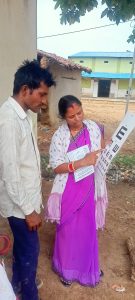Join a powerful, unprecedented alliance for better eye health for all.
Join IAPB-
Choose an alternate language here
For 38-year-old Shankuntala, healthy eyes are just one piece of a much larger puzzle when it comes to a person’s health and wellness.
In addition to being a full-time mom, Shakuntala also works as an Accredited Social Health Activist (ASHA) with the Government of India, providing healthcare and referrals for others in her community of Gadhara Village.
For the past eight years, she has provided advice to women regarding their pregnancies, referring several women each month to local health facilities. She has also supported home-based newborn care and vaccinations for children in her community.

“I got to learn a lot about eye health care,” she explains. “The training program has built my skills in measuring the vision of a person. Now I screen the eyesight of my community members with these simple techniques and refer them to Health and Wellness Centres.”
Dec. 12 is Universal Health Coverage Day – an opportunity to shine a light on the importance of smart investment when it comes to health services. Across the globe, millions of people still don’t have access to basic health care. Through training local health staff like Shakuntala, we are working to change that.
“We are helping ensure health care staff in the community have the skills and knowledge they need to deliver quality health care to people who need it,” explains Kashinath Bhoosnurmath, President & CEO of Operation Eyesight.
“Universal health coverage is needed now more than ever before. Equipping health staff through eye health training brings us one step closer to making that a reality.”
Shankuntala performs basic vision tests and identifies symptoms of conditions like cataracts, refractive error and pterygium – a growth on the eye’s conjunctiva. Armed with the knowledge and skills she gained both during her ASHA training and additional eye care training, she is able to address many of the determinants of health, including some of the root causes of avoidable blindness such as vitamin A deficiency and poor hygiene.
One of the key recommendations of the World Health Organization’s (WHO’s) 2019 World Report on Vision is to implement ‘Integrated’ eye care is care that is part of the local health system. This often requires partnership with local hospitals and often means utilizing local health resources, personnel and infrastructure. ‘People-centred’ means focusing on the needs, preferences and values of individuals and communities.
IPEC has been a core component of Operation Eyesight’s approach for decades, because we focus on the unique needs of individuals and communities, as well as partner with local governments and health programs. In India, this includes opening local vision centres or vision points and recruiting local health workers who are predominantly women to conduct door-to-door screenings.
“Trainings give health care staff in a community the skills and knowledge they need to make eye health care a standard part of the care they provide. Ultimately, this helps make eye care both accessible and sustainable for a community long-term,” explains Dr. Troy Cunningham, our Country Director for India. “Training local health workers like Shakuntala is a key part of that.”
Operation Eyesight has been working closely with the state governments in both Arunachal Pradesh and Madhya Pradesh to establish vision care facilities within already-existing government health centres, such as Health and Wellness Centres. Additionally, we are providing training for ASHAs and other healthcare providers. This has helped make eye health care services available to the most underserved populations.
“Our approach helps ensure that we leave no one behind, especially girls and women, which translates into empowered communities that can care for their own health,” Troy adds. “This work is so exciting because it aligns with the transformative impact on India’s health system.”
For Shakuntala, it has enabled her to cater services to the unique needs of the patients and families she serves in her own community.
To learn more about our partnership with the Government of India, read this success story